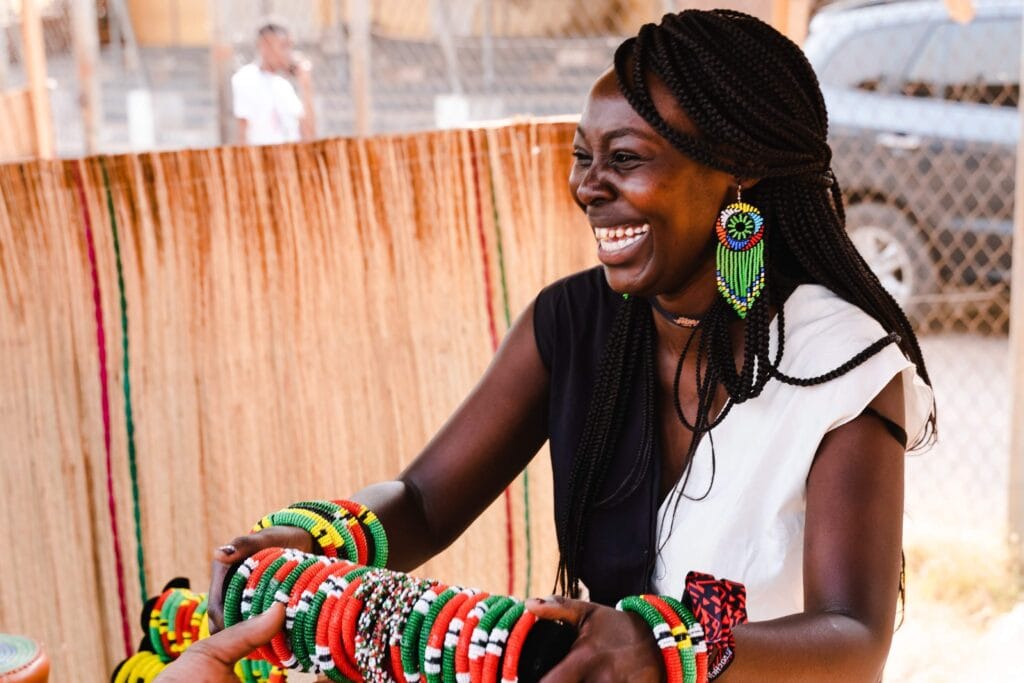Ten years ago, the technologies we have today only existed in movies. What was once futuristic is now a reality unfolding before our eyes. In one sense, this advancement has greatly enlightened humanity and simplified daily life. In another, it has stripped away some of the natural touch of our humanity. Regardless, a new trend is emerging in Africa concerning AI and Ghanaian culture. A wave of technological advancement is sweeping across the landscapes of Africa and the world.
Across Ghana, artificial intelligence is becoming part of everyday life. From farms to markets, hospitals to classrooms, AI is not only driving development forward but also helping to protect the heart of Ghanaian culture. Rather than replacing traditions, technology is finding ways to uphold and strengthen them.
Here’s a closer look at how AI and Ghanaian culture are working together to shape a future that honors the past while embracing new possibilities.
1. Farming Smarter, Keeping Heritage Alive

Agriculture holds deep meaning across Ghana. Farming is not simply work; it is tied to family, festivals, and community identity. In Kumasi, Brong-Ahafo, and many other regions, AI tools are now helping farmers improve their yields while preserving traditional ties to the land.
Modern applications like KaraAgro AI provide farmers with early warnings about pest threats, soil conditions, and rainfall patterns. One farmer shared how drone data highlighted trees needing urgent care, saving parts of his harvest. Imagine the positive impacts AI will have on the agriculture sector in Ghana if it is used in a controlled and ethical way.
With artificial intelligence in Ghanaian agriculture, farmers protect their livelihoods and ensure that ancient celebrations like Homowo and Yam Festivals continue to flourish.
AI and Ghanaian culture come together in these moments: technology respects the land while helping farmers adapt to changing weather and economic challenges.
2. Supporting Market Traditions Through AI Finance

Ghana’s markets are more than places to shop. They are hubs of energy, tradition, and social connection. The women known as market queens carry forward a long legacy of entrepreneurship. Today, AI is helping them expand their businesses and protect their independence.
Mobile platforms like MTN Mobile Money use artificial intelligence to study user patterns, offering microloans and financial tools tailored to traders’ real needs. A kenkey seller in Ho can now access credit through her mobile phone without relying on risky lenders. Traders no longer face long bank lines or confusing paperwork.
Through AI and Ghanaian culture, financial inclusion becomes a reality. Small businesses grow stronger, families build security, and marketplaces remain vibrant centers of community life.
3. Expanding Healthcare Access with AI Innovation

Healthcare in Ghana rests on community values. Families care for one another across generations. In rural clinics, AI is making it easier to continue that tradition of communal wellbeing.
Organizations like mPharma use artificial intelligence in Ghana to forecast medication demands, helping clinics stock the right supplies before shortages occur. MinoHealth AI Labs designs tools that quickly detect diseases like malaria, allowing doctors and nurses to act faster.
In Tamale, a nurse used an AI diagnostic app to confirm a malaria case within minutes. That speed meant faster treatment and a healthier child, back to playing football by evening.
AI and Ghanaian culture come together here as well. Technology supports traditional values of community health and collective responsibility, ensuring more families stay strong and connected.
Also See: Ghanaian Traditional Medicine: Remedies and Practices You Need to Know
4. Personalizing Education While Honoring Knowledge Traditions

Learning holds a special place in Ghanaian life. From Ananse stories passed down through generations to modern classrooms, knowledge sharing is a cultural pillar. Newcomers to Ghana must also learn its culture, especially if they want to raise children in Ghana who adapt to its rich heritage.
AI is enhancing education by helping teachers meet students’ individual needs. In Cape Coast, teachers use AI platforms to spot learning gaps and adjust lessons before students fall behind.
Initiatives like Ghana Code Club teach coding and artificial intelligence to schoolchildren, combining traditional storytelling with modern skills.
Imagine a teenager in Takoradi designing an app that tells Asante history in Twi. Through programs like these, AI and Ghanaian culture blend to preserve history while preparing youth to shape the future.
5. Preserving Indigenous Languages Through AI Technology
Language carries the heart of Ghanaian culture. Twi, Ga, Ewe, Dagbani, and many others connect families and communities across the country. Yet global pressures make it harder for younger generations to learn and maintain native languages.
AI research is stepping in to help. The Google AI Research Center in Accra works to integrate Ghanaian languages into translation tools. GhanNLP projects create digital Twi dictionaries and develop language apps that reach Ghanaians everywhere, from Kumasi to London.
One Ghanaian family abroad used an AI-powered app to teach their children Ga phrases for the first time. The excitement of hearing “Mii ni” in a new generation’s voice showed how AI and Ghanaian culture can work hand in hand to keep heritage alive.
Language preservation strengthens cultural identity. Artificial intelligence in Ghana is not replacing traditional speech—it is giving it new platforms to thrive.
Technology and Ghanaian Traditions: A Natural Partnership
Across farms, markets, clinics, schools, and homes, AI finds ways to support and enhance Ghanaian traditions. Technology adapts itself to the needs and values of communities, rather than expecting communities to adapt to it.
Artificial intelligence in Ghana does not erase culture. It amplifies the spirit of innovation, resilience, and communal strength that have always defined Ghanaian life.
Through better farming, stronger businesses, faster healthcare, personalized education, and protected languages, AI ensures that tradition is not lost—it evolves and grows stronger.
As Ghana continues to innovate, it offers the world a lesson: progress does not have to come at the cost of culture. AI and Ghanaian culture prove that heritage and technology can move forward together, each enriching the other.
The future of Ghanaian traditions lies not in resisting change, but in shaping it with wisdom, pride, and creativity.











